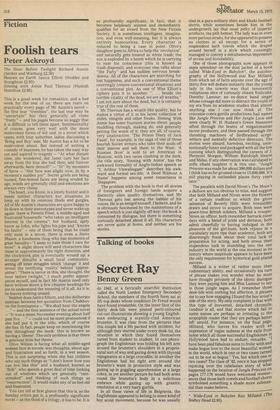Fiction
Foolish tears
Peter Ackroyd
The Hour Before Twilight Richard Austin (Secker and Warburg £2.50) Heaven on Earth Janice Elliott (Hodder and Stoughton £2.95) Sinning with Annie Paul Theroux (Hamish Hamilton £2.95) This is a good week for romantics, and a bad week for the rest of us; there are tears on practically every page of Mr Austin's novel — the first tear "trembles", the last tear may be "uncertain" but they generally all come "freely" — and his pages become so soggy that it is difficult to tell them apart. Sentimentality of course, goes very well with the more malevolent forms of wit and, in a novel which opens with four suburban ladies discussing a 'Bring and Buy' sale, Mr Austin has a lot to be malevolent about. But instead of writing a comedy of manners, he has taken the easy way out and aspired to tragedy — "At what distant time, she wondered, did Janet turn her face away from the kiss she had then, and forever afterwards, been denied?" — "lit" by moments of farce — "Her face was alight now, lit by a moment's sudden joy". Secret griefs are being nursed, fine-boned faces are being eroded by age, winds are generally chill and emotions are always very cheap.
The heart, you know, is a lonely hunter and it needs neither characters nor situations to keep up with its ominous thuds and gurgles. All of Mr Austin's characters are quite happy to lie down in their stereotypes and never wake up again: there is Pamela Freer, a middle-aged and frustrated housewife "who takes an intelligent interest in the cinema"; her husband, aptly know as John, who lights his pipe and "knows his faults" — one of them being that he could only exist in a novel; there is even a Steve Mason, a handsome thug who has moments of great banality—"I seem to hate those I care for most". A slight shove will send characters like these in approximately the right direction, and the clockwork plot is eventually wound up: a stranger disturbs a small local community. setting off inner struggles which 'change' it and reveal the terrifying 'reality' behind 'appearances': "There is terror in this, she thought, the hour before twilight." I much prefer appearances myself, and in fact Mr Austin need only have written down a few chapter headings for me to understand the meaning of it all. As it is, he leaves nothing unsaid. Neither does Janice Elliott, and the deliberate contrast between her quotation from Chekhov on the frontispiece — "We shall hear the angels ..." — and the first sentence of the actual novel — "It was a mean November evening about half past five ..." — could not be more pronounced if she had put it in the title; which of course she has. In fact, people keep on mentioning the title throughout the book: this is known as having a 'theme'. The only problem is thar there is precious little but theme.
Olive Wilson is facing what all middle-aged women face in novels: wet thoughts, about age and frustration and so forth, in a wet season. This is not surprising when she has children who say such things as "I don't know how you can live like this" and a husband, known as "Bob", who spends a great deal of time looking out of windows which are generally "rainstreaked" and thinking of such things as "resurrection". It would make any of us feel old and frustrated.
You can tell at first glance that this is, as the Sunday critics put it, a profoundly significant novel — as the third of a trilogy, it has to be. It is so profoundly significant, in fact, that it becomes helplessly solemn and immediately qualifies for an award from the New Fiction Society. It is sometimes intelligent, imaginative, and even well-meaning, but it is always entirely humourless. Every character is reduced to being a case in point: Olive's daughter goes to Africa to help the 'revolution', and naturally gets treated as white trash; the son is exploded by a bomb which he is carrying to ease his conscience (this is known as trash-disposal); and everyone else talks about "the Party" and has sudden nervous breakdowns. All of the characters are searching for lost happiness, and such a conventional theme unerringly creates conventional situations and a conventional plot. As one of Miss Elliott's ciphers puts it to another: ". . . beside the terrible vitality of the dead, we are all wraiths." I am not sure about the dead, but it is certainly true of the rest of them.
Mr Theroux has a wraith-like quality, but he makes a virtue of it in his latest collection of exiles, emigres and other freaks. Sinning With Annie has some fourteen stories about people muddling through, making do, and generally getting the worst of it; they are all, of course, very unattractive. 'The Prison Diary of Jack Faust', for example, is the saga of one of those boorish Soviet writers who take their souls off their sleeves and sell them to the West; 'A Russian Ikon' is sold to an American in Moscow, with two races clashing in the dark; the title story, 'Sinning with Annie', has the awkward formality of Anglo-Indian speech as "I, Arthur Viswalingam" describes his awkward and formal sex-life; 'A Deed Without A Name' happens among some expatriates in Singapore.
The problem with the book is that all stories of foreigners and foreign lands acquire a distinctly alien quality themselves, and Mr Theroux gets lost among the babble of his voices. He is an emigre himself, I believe, and he is obviously fascinated by the mannerisms of a speech which is just slightly off-key: the book is consumed by dialogue, but there is something curiously detached about it all. His characters are never quite at home, and neither are his stories.


































 Previous page
Previous page